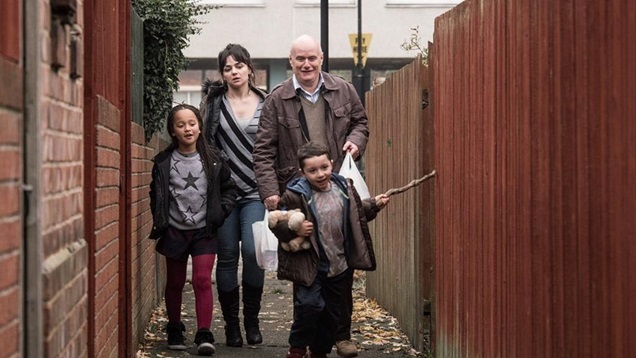Ken Loach's Magnificent Comeback to Cannes

CANNES: The admirers of Ken Loach’s work sighed with relief, when after constant references to his imminent retirement, he is back in Cannes for the nineteenth time with his film ‘I, Daniel Blake’.
The film comes ten years after Loach won the Palme d’Or for ‘The Wind That Shakes the Barley’ and two years earlier he was at Cannes with ‘Jimmy’s Hall’. His latest film underlines the fact that the close-to-80 director is back on track in what he presents so movingly on screen, the fate of hapless people confronting an indifferent regime.
The content of Loch’s films resonate well with India because their subjects connect with India. ‘I, Daniel Blake’ cries out for an Indian adaptation, if only we could do it with Loach’s minimalist style and masterful simplicity, which make his characters so credible and alive.
Ken Loach’s latest film is on the Citizen vs the State. It delves into the mindless ways in which the middle class are mowed down by the British welfare system. The script written by Loach’s regular collaborator Paul Laverty, although at times overly dramatic and didactic, manages to pull at the heartstrings because of the bristling intensity with which it rests its case. Loach’s concerns may be predictable; more so as his film unfolds, but it is the way he presents them that give them another tone, another colour.
The film follows 59-year-old Daniel, a middle-aged, skilled British carpenter (brilliantly portrayed by actor Dave Johns), who lives in Newcastle. He immediately strikes one as a decent, honest working class man with a quiet sense of humour. Daniel suddenly suffers a heart attack and his doctor says he cannot return to work until he gets better. He now has to apply for the government allowance that will sustain him through his unemployment. With that, he embarks on several humiliating encounters with an infuriating bureaucracy, which, finally, kills him.
The film starts with amusing, tell-tale touches as it observes the unfortunate man’s predicament. It sees claimants like him dealing with obdurate government lackeys mouthing bureaucratic inanities. Daniel faces ridiculous delaying tactics, such as applying for a series of jobs in order to prove that by not being selected he could indeed be handicapped. Their evaluators are like a brick wall, stolid, unbending, unfeeling. Daniel sees a young single mother with two children, newly arrived from London and in search of housing, being rebuffed for being slightly late. He intervenes on her behalf. The two then start an unlikely friendship.
What happens so relentlessly to this man ends with a low-key homily that speaks simply and directly for the character and resilience of the under-privileged. All the way though, the film upholds the dignity of those who are suffering at the unfeeling hands of the government. It sees the protagonist as an honourable man making a living through the dexterity of his hands, however inept he may be on a computer or the internet. Most of all he is kind and caring, looking out for others at every opportunity. Not for a moment does he invite pity. The film, like most of Loach’s work, looks at the marginalised and the helpless with a loaded, pointed anger and compassion. The main actor’s performance is being tipped as a Palme d’Or winner.
On quite another plane and tone, hard to see consecutively, is the competitive entry from South Korea, ‘The Handmaiden’ directed by Park Chan-wook. Lavish and lusciously filmed on a grand scale, the film revels in human duplicity at every level, the poor hand in glove with the rich, for gaining the kind of life they want. The film also flaunts lesbianism as every woman’s right (Park’s earlier film was noted for its sexual flamboyance), with prolonged sensuous love scenes between the two women that are as breathtaking as the film’s sweeping landscapes.
The film, ‘The Handmaiden’, based on the novel titled ‘Fingersmith’ written by Sarah Waters set in London during the 19th century, moves to South Korea of the 1930's when it was ruled by Japan. What begins as a seemingly genteel story of intrigue veers into steamy sensationalism and unhinged kinkiness. The film starts with a young girl being hired as the maid to a Japanese heiress who lives in a dark secluded mansion where she is guarded by her domineering uncle. Little do they know that the maid is a former pickpocket recruited by a swindler who poses as a Count. She has been planted to help him seduce the heiress and have her locked in a mental home, while he escapes with her fortune. The film is in three acts, each one belying the conclusions of the previous one. The last is brutal in its blood-letting torture contrasting with scenes of the two ladies escaping to their love nest. Bizarre, but also compelling, and so beautiful to look at.
Park is the new face of contemporary South Korean Cinema.



